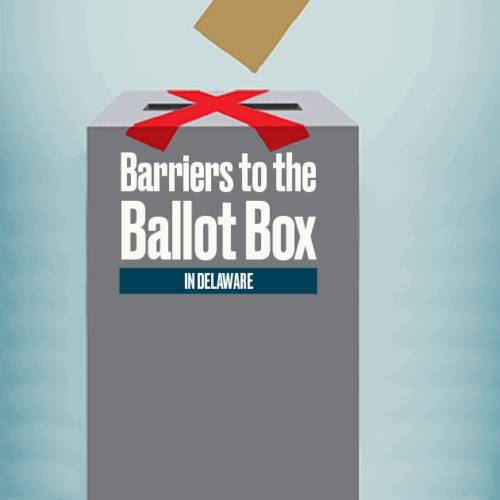Introduction
Voters in Joe Biden’s home state don’t have access to early voting this fall, and if their absentee ballots are delayed in the mail, they won’t count.
Delaware also has two laws on the books that research shows disproportionately disenfranchise Black and Latino voters — requiring that particular forms of photo ID be shown at the polls, and stripping voting rights from people in prison or on parole.
Sign up for The Moment newsletter
Our CEO Susan Smith Richardson guides you through conversations and context on race and inequality.
The legislature has approved early voting at select local polling centers for up to 10 days before elections, but it’s not available this fall. The law doesn’t take effect until Jan. 1, 2022.
The state has, however, moved to make voting by mail easier this year amid concerns about the COVID-19 pandemic.
Here’s a look at some of the most significant issues related to voting rights and access in the state:
Absentee ballots
Delaware is allowing universal absentee balloting this year and has mailed every registered voter an application form for the Nov. 3 election.
Republicans sued, arguing that the move “upsets established constitutional means for voting absentee by flooding all registered voters with unsolicited applications to receive a voting-by-mail ballot, allowing any voter for any reason [or no reason at all] to vote by mail.” But a judge ruled that the legislature had the authority to approve the change.
Voting rights advocates also sued. Citing concerns about a national slowdown in U.S. Postal Service delivery, the state’s League of Women Voters asked to have officials count all ballots that are postmarked by Nov. 3 and received up to 10 days later. A judge rejected that demand, calling the claim of potential disenfranchisement “too speculative.”
Instead, ballots must be received by the time polls close at 8 p.m. on Election Day to be counted.
Alternatives to the mail are limited in Delaware. The state offers secure drop boxes, but in only four locations in the state, with just one accessible 24 hours a day.
Felony disenfranchisement
Thousands of Delaware residents are prohibited from voting under a state constitution that takes that right from people with felony convictions who are serving a prison sentence or still on probation or parole. The right to vote is permanently stripped from Delaware residents convicted of murder, sexual offenses or certain crimes related to abuse of public office.
It used to go further, though. In 2013, the state removed a five-year waiting period for voting rights that kicked in after a sentence was completed. And in 2016, the state eliminated a requirement that people with past convictions pay all associated fines and fees before they were allowed to vote.
Read more in Money and Democracy
US Polling Places
Volunteers in Utah help Navajo residents with addresses so they can vote
Recent changes have broadened access to the polls.
US Polling Places
Maine, an otherwise progressive voting rights state, won’t change absentee ballot deadline
Proponents worry voters won’t have a chance to fix mistakes ahead of Election Day.


Join the conversation
Show Comments